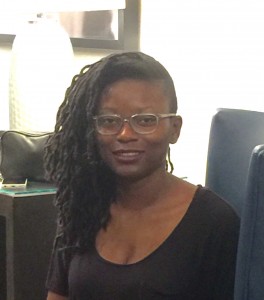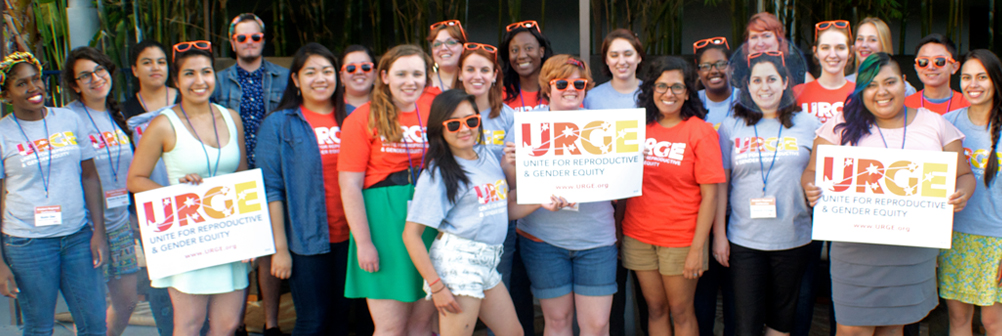Alumni Spotlight: Diana Sencherey
 School, grad year, major
School, grad year, major
I graduated from Ohio State University in 2014. I majored in Public Health and minored in Women’s, Gender and Sexuality Studies
How were you involved with URGE?
I saw an ad for the 2012 RJLI in a campus newsletter. The words reproductive justice caught my eye. I had just been introduced to that term through my women’s writing class. We read a selection from Undivided Rights and the Combahee River Collective. I was struck by the advertisement using “reproductive justice” because the words reproductive justice means something specific. Up until then, my involvement with activism had been a bit of a letdown because the organizations I’d worked with didn’t start from that “justice” framework. I wanted to work with anyone that was not shy about using the words reproductive justice. The ad also promised the opportunity to develop leadership skills and work with other young activists, which got me very excited. I’ve been involved with URGE ever since then.
What do you do now and how do you bring a reproductive justice frame to the work you do?
I work as a case aide for Equitas Health (formerly AIDS Resource Center). My job is to assist our licensed Medical Social Workers with case management for clients living with HIV. So I’m in charge of making sure our clients’ medication copay is paid for by Ohio Department of Health. I provide clients transportation to medical appointments, food pantries and social service appointments. I also buy and issue gas cards, bus passes and parking tokens to our clients and MSWs. My understanding and commitment to reproductive justice really informs how I approach my work. I think the RJ frame is a useful tool, especially for people that work with vulnerable populations. The first thing for me, is keeping in mind I’m serving a population that has historically had difficult relations with social service/government agencies/health care system. It is my job to build trust and show that I’m invested in whatever community I’m serving, that I’m not here merely to “save” people. I understand RJ to mean looking at an individual as a whole person, and how that individual’s identities shape their interactions with the world. Sometimes it’s a simple as relating to a client around racial/gender/sexual lines. Most often its being mindful of how lack of access to affordable housing impacts whether or not a client will be medication adherent. I bring the RJ framework by being mindful of the ways race/gender/class/ability/health literacy/sexual orientation impact our clients’ ability to stay healthy and their desire to stay in care. One of the most important things I always keep in mind is meeting clients where they’re at. RJ framework means not just helping vulnerable populations but also empowering them to be able to advocate for themselves.
What skills or knowledge did you learn from URGE that you use in your current work/life?
URGE really taught me how to use my voice as a tool for change. Often times young people’s voices are dismissed and silenced. With URGE I’ve learned how to not only demand a seat at the table but to make sure that if I’m asking to be heard, I say something worth hearing. RJLI was an eye opener for me in terms of broadening my understanding of what reproductive justice was and why it’s needed. My work as a Student Journalist likewise allowed me to communicate about reproductive justice issues. All of that has really given me an advantage in my professional life. My involvement with URGE laid the foundation that I continue to build on. I can speak on issues now because writing for Choice Words honed my communication skills. Participating in advocacy day comes natural thanks to the prior work I did as a student member with URGE. One of the biggest skills I learned with URGE is how to use numbers and facts to support the work that I do. My favorite part of RJLI was hearing from educators, researchers and the data gurus. I learned during the institute that its lot easier to push your agenda when you have the numbers and facts on your side. Working as a student journalist is how I learned how to get accurate data to back up my work. For me it was important that I not only learn the above skills, but I learn them within a reproductive justice framework, that is, the privilege of having those skills and the duty of using them in a responsible manner.
What are your top priorities in politics and/or reproductive justice?
Right now I am very much involved in the world of HIV/AIDS, which I love by the way. I think HIV really gets at the heart of reproductive justice in a way very few issues can. HIV/AIDS is not just a sexual health issue. It is at the intersection of race, gender, citizenship and access to health care. For example, provisions within the affordable care act like Medicaid expansion and the elimination of preexisting conditions has made it possible for people living with HIV (HIV was previously a preexisting condition) have broader access to health care. I also get to advocate on behalf of young people because of the way that HIV affects young people. LGBTQ youth who end up kicked out of their homes often engage in survival sex work, and that’s a population that’s being neglected when we don’t bring young people to the table. According to the CDC, Youth aged 13 to 24 accounted for more than 1 in 5 new HIV diagnoses in 2014. With HIV as my priority, I get to address all of the issues that matter to me, issues like institutional racism, comprehensive sex ed, queer health and gender inequality.
Who inspires you?
The women in my family inspire me every day. Even when we disagree, there’s the understanding that my liberation, is tied to their liberation. I am also inspired my chosen family of queer women and people of color. Being surrounded by people who are as invested in my liberation as queer woman of color, as much as I am invested in theirs, inspires me to get up every day and keep going, even when the going gets tough.

